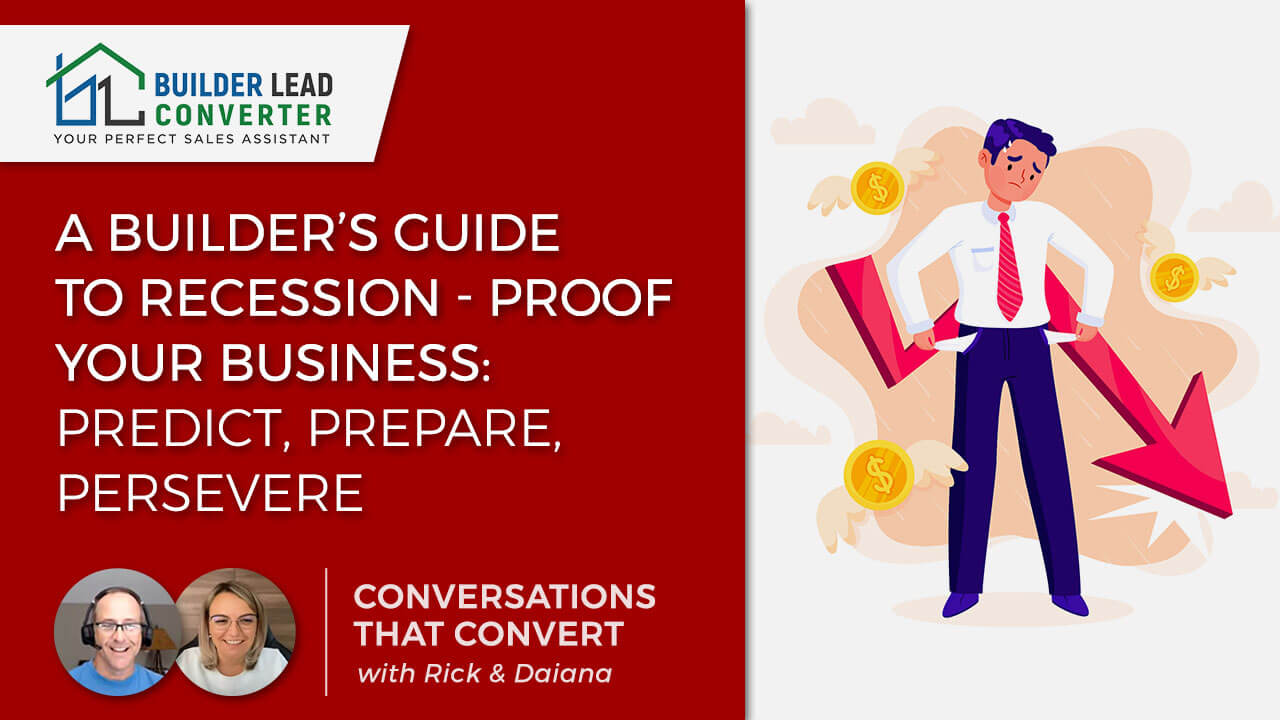Worried about the current state of the economy and its impact on your home building or remodeling business? You’re not alone!
Don’t panic – there are things you can do to recession-proof your business and ensure its success in spite of challenging times.
In this new episode of Conversations that Convert, we break down Elon Musk’s advice on how to deal with a recession: Predict, Prepare, Persevere. We look at each point from a builder’s perspective and what you can do to minimize the impact of a slow housing market caused by the recession.
Watch/Listen as we look at how you can recession-proof your business for any economic climate with smart marketing techniques that will increase sales even during hard times like these!
Builder Lead Lead Converter captures & converts leads for home builders & remodelers so they can grow sales revenue and margins. Find out how https://www.builderleadconverter.com/
Transcript:
Today on conversations that convert, we’re gonna talk about a builder’s guide to recession-proofing your business and review how to predict, prepare for and persevere through a recession. Let’s get started!
Welcome to conversations that convert every week, we’ll spend about 10 to 15 minutes tackling relevant lead generation marketing and sales topics for remodelers, home improvement companies, and home builders. Conversations that Convert is brought to you by builder lead converter, your perfect sales assistant.
And now here’s Rick and Daiana.
Rick: Daiana, welcome back. You look wonderful.
Daiana: Thank you. Thank you. It’s good to see you again.
Rick: Good to see you too. Oh yeah, it’s been a couple of weeks. I’m doing well. Thank you nobody has COVID in our house, so that’s always a positive.
Daiana: That’s very…
Rick: That’s good. And I know you’ve been kind of a long hauler. Has this been recovering from COVID and are you still getting better each and every day?
Daiana: Yes, I’m getting better and better. And now I have this thing on my throat, so I consider this like recovery, but. It’s part of the recovery.
Rick: Part of the recovery. You sound more distinguished, so…
Daiana: Yes.
Rick: That’s we’ll, we’ll call it a positive here.
Daiana: Yes. It makes me unique. So you can recognize my voice.
Rick: You are definitely unique. Absolutely. We love having you on the show so Daiana, what are we talking about today?
Daiana: So today we start a new series, how to prepare ourselves for a session. And here we, we have for you a guide, and of course, we have some proof of things that are tested and things that can work and we will learn how to predict, how to prepare, and how to persevere at the same time. So three things, and that’s part of our guide to recession.
Rick: Absolutely. This is something that has come up probably in the last, I would say 60 days now it’s rough, it’s July 2022. We started noticing the market was cooling off in May. As interest rates started to go. And so we noticed that with the fed, continuing to talk about raising interest rates with inflation going up and up and up potentially we’re starting to see some layoffs happening right now, too. Actually not potentially there are layoffs happening as, as we speak. And so in a recession, the two key indicators we get are as our, our gross domestic product or our, our open as the economy goes down and unemployment goes up. And so you kind of, you kind of create this X, if you will. And that’s what we’re starting to see right now so we’re going to really be focusing on housing recession and you know, it’s, you’ve got inflation going up, interest rates are going up let’s takes a lot of buyers outta the market. The economy, may some people say, maybe you’re already in, into this in the recession. So we don’t know that yet. We’re still waiting for the second quarter numbers to come out, to find out if we’ve had two consecutive quarters in a role where we’ve had a negative gross, gross domestic product, as far as growth. If that’s the case, then, then the economists say, yep, you’re in a recession, but we’re specifically looking at what a builder can do to, to minimize the effects of a, of a slow market, which is essentially what’s happening here.
Daiana: So we can say, so, we are in the middle of the recession. We can say it’s initially…
Rick: We potentially are, you know, we’ll find out here as soon as the numbers come out for the second quarter. But who’s your favorite car manufacturer, Daiana?
Daiana: Well, you know who, who that is because I have an electric car, but obviously I really admire what Tesla and Ellen Musk did with the car. So yeah, I think I can say that Ellen, I, I read his books and his, his biography. So I, I like his style.
Rick: He’s a pretty pretty amazing guy. So the richest man in the world is not afraid to speak his mind. He, he came out actually a few months ago and he talked about, you know, we are going to go into a recession and he already took some steps as we’ll discuss today with Tesla but he, he comes up with this, what’s called a PPP strategy is where you predict, prepare and persevere. So it’s a nice, simple strategy that we can use. And so we’re gonna take and apply this strategy for builders. What builders can look at to predict what they can do to prepare, and then what they can do to persevere. And we’ll be rolling out these ideas over the next six weeks as we go through this, this series. And so I wanna give a little taste of each one today. So those of you that are listening. Yeah. You can get some ideas today, but. You can then get more ideas and get a little deeper understanding of how to predict, prepare for, and persevere through a recession in the probably months. And perhaps even, you know, more, more than a year to come. Some people are projecting somewhere between an 18-month recession or even more than that. More like 24 plus months, we, this would be the fourth housing recession if we hit one here since about 1991 so we had one in 1991. We, we had one in right at, in nine, 2001 after the tech bubble burst in the stock market. And then after nine 11 happened caused a short recession. Of course, we had a great recession, which happened in 2008. We had a really, really short one. It’s kind of even hard to call the recession in 2020. That was really self-induced though, that was because of the government shutdowns that happened in early 2020. So it was about a two-month recession. That’s when we saw unemployment, you know, just Skyrocket because, but that was really not a natural recession. It was a government-imposed recession. So that one, I don’t know if we would call it that so really, if what happens now, it’ll be the fourth recession we’ve seen. So a little trivia for you: What is the longest amount of time between recessions that we’ve ever seen, in the United States, Daiana? Now I know you’re, you, you may not know this, but take a, take a guess. The longest amount of time, how many years is the longest amount of time that we’ve seen between one recession and the next.
Daiana: I think let’s say 10, 10 years, seven to 10 years.
Rick: Well, you’re pretty close. Yeah. On average, you get a recession approximately every seven to 10 years, the longest amount of time between recessions is 14 years and of the history of recorded recessions. And guess when that time period is…
Daiana: We are now, now.
Rick: Exactly, it’s right now, right now. Exactly. So our last recession happened in 2000. 2008, 2009. Yep. So now here we are in 2022, but it’s been about 14 years since we’ve had, a recession. So in other words, we’re, we’re due, we’re due. And, and the main thing to remember about recessions is that it’s an, it’s a, it is part of a market cycle. If you invest in the stock market, you know, you have bear markets and you have bull markets. So we’ve seen, we’ve seen both during that time right now, we’re in a bear market and so the market is going down recessions are just a natural part of a normal market cycle. So as it relates to predicting what we wanna focus on is staying multiple moves ahead, multiple moves ahead. So, because a recession is part of a market cycle, it means just like when you’re-you’re planning, when times are good, you need to plan for when times are not so good. And that’s what we will now focus on right now. And that’s, we’re gonna get into our prepare section and then ultimately our persevere so think of a recession as like a volcano you know, prior to a volcano erupting, there are lots of things that happen underground. Right. I mean, there’s, there’s all sorts of movements and things that are happening. And so we call these indicators. So as part of predicting a recession, we wanna look at indicators. And so for housing, there are six indicators that we look at. These are gonna vary a little bit from say, what’s gonna happen with a normal economy because we can have housing recessions when the economy is performing well. We can also have the housing market do well when the economy is performing poorly. So we’re gonna take a look at it from purely a housing standpoint, but there are six indicators that we can look at, that’s to understand if trouble is brewing beneath the surface. So the first one we look at is interest rates. Then invent. Yep. Then housing inventory. So supply and demand buyer confidence is another big one, you know, are people bullish on the market and are they want to remodel their homes? So they wanna buy new, buy new homes. So buyer confidence is a big one. Unemployment. We, look at inflation as the fifth one. And then, the finally the last one is, you know, all real estate is local, local, local. So when it comes to that with local being real estate, the main thing we look for in a recession is we look at migration patterns. So do you have more people moving out of your area or more people moving into your area? So there are certain areas that are going to attract people, and that’s gonna, that’s gonna put more demand. So, that particular location might do better than say a location that has more out-migration or there are more people moving out than are in. So you’ve got less demand supply goes up and then that causes prices to fall with a, a slower housing market. So those are the six things we, that we look at and so the key point is we want to think in terms of what will be versus what is. We want again, to stay multiple steps ahead as we are predicting this. So what will happen versus what is, and that’s what it all comes down to your plan for preparing and persevering through a recession. So these are simply just there to tell us there could be trouble brewing on the horizon. Anything else you wanna add? Daiana or Daiana?
Daiana: I think it’s it’s so what you’re saying is that it’s, there’s nothing wrong with the, with this period. So it’s natural, it’s normal. And I, I think it’s, it released the pressure that it’s not something let’s say that we can panic us. It’s normal. And it’s part of the natural cycle every 10 to 14 years. We can prepare in advance for example, right now for the next 14 years and enjoy it and actually enjoy this cycle. And…
Rick: That’s a really good point because in any market there’s opportunity there anyone can, can do well in a good. Literally, anyone can do well, but there are only a select few businesses that will builders that will really do well in a poor market or a recessionary market. So this is where you really can grow your business and find the opportunity I think even more so than a good market because you have less competition. Yep. Absolutely true. So let’s move on to prepare.
Daiana: Yeah, let’s prepare.
Rick: Let’s prepare. Right. So prepare, simply getting ready for, for, for what’s ahead so when it, so when it comes to preparation, there are really four things that you want to look at for going into a recession. And the first one is if you wanna put any big risks on pause. So anything that, any decision that you would for your company or that you would make say based on a personal. So for a company I might look at, if I’m looking at making a big land acquisition, that’s gonna potentially cause vulnerabilities for my company. I might wanna put that on pause same thing for if I’m going to expand, maybe make some hires where I’m going to have, you know, a lot more overhead. I wanna look at that as a, as a risk to my company and put that on, on pause, but any sort of big risk for your company you, you want a capital expenditure if you. Put that on pause. And also I can look at that from a personal standpoint is now a good time where I should be going out and financing a new car, you know, spending $70,000 on a new car or going out and, you know, mortgaging myself on a with a new house or taking on something that would cause me to be, to be vulnerable. The second key point is to cut back on superfluous. I don’t, we were just trying to pronounce this correctly before this superfluous. Spending I’m probably not pronouncing it correctly, but you know what I’m talking about spending money on things that you really don’t need, things that would be considered luxury items. Number three is to reduce costly overhead. And I think, you know, one of the things we’re gonna look at here is that when you’re looking at your company right now if you have employees that are underperforming, this is probably the time to let them go cuz obviously we can reduce our, our overhead, but those employees also put your company at, at risk. And then the fourth one is to avoid any high-interest debt or really any interest in general as much as possible. So cash is king. You’ve heard that before in a recession. That is never more true.
Daiana: I like it.
Rick: All right. Cash is, yeah, cash is king.
Daiana: I like it. Cash is king.
Rick: Cash is king. And you know what, in those businesses that do have cash available to them, when the market goes down, There’s gonna be opportunities to actually make purchases for assets at well below market value. And that’s really where you make your money, you know, I remember when the market crashed in 2008 and there was land everywhere that banks were trying to unload land. I remember one developer here who had a lot of cash and he went in and he bought up lots of land for pennies on the dollar. And you know, he made millions of dollars doing that very, very shrewd investor. And that’s what it takes is just to be disciplined with that. So should we talk about Per-persevering to the last one?
Daiana: Yes. Let’s move forward. Persevere. Yeah.
Rick: So for, so for persevering, you know, this is all about, like you mentioned it before. It’s a natural cycle. So we plan for good times. Now we want to plan for not-so-good times. So the companies that are able to plan and execute during a recession, are the companies that are gonna persevere. And they’re going to get ahead. So this is looking for, you know, not only survival but also opportunity if you’ve prepared well and you can weather the storm, you’re gonna come through it relatively unscathed. And that’s gonna create opportunities for those businesses that don’t come through it. So this is a great time, you know, for perseverance, you know, to be looking at you know, buying out other companies where, you know, companies that are going out of business, looking for, again, land opportunities looking to acquire companies, or maybe merge with other companies where you can, you know, bring in that book, book of business. So we’ll be talking about specific things here coming up in August on ways to preserve. But a couple of key points here is, you know, number one, I think we wanna operate as if we’re already in a recession. That’s the key to looking at we’re already in a recession. So what would you be doing differently? So start with that mentality, and then number two is the antidote is we don’t wanna fix problems. We wanna prevent problems. So don’t wait for the problem to happen. Go out, plan and execute. So the problem never happens in the first place. And so that’s going back to the preparation aspect of this, so what we’re gonna be doing Daiana over the next six weeks is, you know, next week, we’re gonna talk more about predicting and getting into those housing indicators and where you can grab that data. And I’ll, I’ll share that with you and also how to calculate that data for your local market. Then we’ll start getting into the preparation aspect of it and how you can prepare. We’ll spend a couple of weeks, on that. And then finally, we’ll look at the perseverance part of it. And that’s really where, how can you get ahead? After you get through the recession, even during the recession, how do you get ahead and, and set yourself up so that you can not only take market share now and you can capitalize on opportunities, but then you can use that to springboard your business when the market rebounds and you’ve got more demand for your homes or your remodeling services.
Daiana: I’m looking forward to those weeks. Sounds very interesting. And I will also apply it. So what you’re saying, is to stay alert and see the opportunity so that you can act fast and see what’s around you.
Rick: Absolutely. Yep. There’s to always the glass is half full, right? Yes. We can be complaining about what’s happening with the market, or we can be excited knowing that, Hey, the market is going to contract. It’s gonna change. This is an opportunity for me to get ahead of my competitors and be able to build the type of business that I’ve dreamt of.
Daiana: I’m excited about the next month and the next period. And I’m confident, everything will be in exact order for everybody
Rick: Ab-absolutely. Yep. So we’re gonna try to get ahead of it right now, by predicting it. No one knows exactly when, it’ll happen, but we’ll go over those indicators here starting next week. So until then we are, you know, feel free to schedule your strategy, call me today, and find out how much time we can free up so you can focus on larger, more profitable jobs. And one of the things that we will be launching here very quickly is that we are going to put together a little bit of a training tutorial for you, an opportunity for you to go ahead and do your own recession checklist for yourself. So in other words, look at your own company. We’ll give you a little bit of training here. Couple some videos and some things to look at and say, okay, what’s happening in my market. Here are some things to look at, am I prepared? And here’s how I can persevere so that’ll be coming out very soon as we go through this series. So until then for my brothers and sisters in Christ, me the grace of the Lord, Jesus Christ, the love of God, and the fellowship of the holy spirit be with you all. We’ll see you next time. Bye, everybody.
Daiana: Bye.






Recent Comments